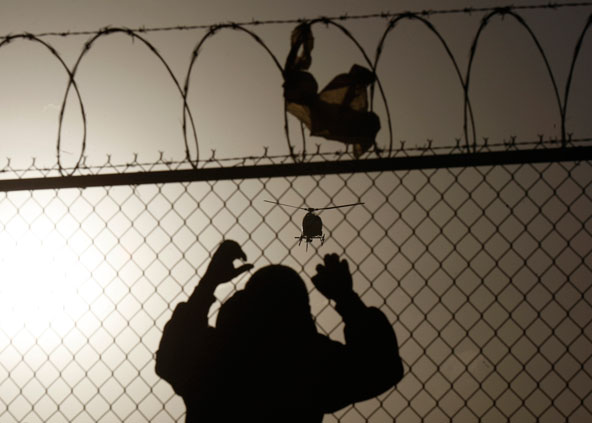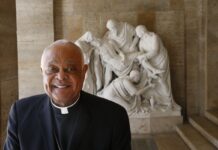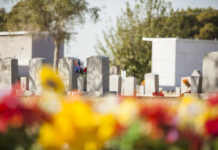
WASHINGTON (CNS) — While politicians and advocacy organizations work at coming up with legislation to reform the U.S. immigration system, the Jesuits are tackling some of its problems head-on at the Mexican border, in higher education institutions and in parishes.
Soon, they’ll start analyzing what changes might help people to stay in their homelands.
Two reports released by Jesuit institutions in recent weeks lay out problems and propose ways of addressing two complex situations: how undocumented immigrants are treated as they migrate and what undocumented students encounter in Jesuit colleges and universities.
Jesuit Father Richard Ryscavage, director of Fairfield University’s Center for Faith and Public Life and a professor of sociology and anthropology, oversaw the colleges study. He told Catholic News Service that both efforts are part of the Jesuits’ worldwide focus on migration of the past five to six years.
He said other components in the United States include a project in Long Island to develop a model for debating immigration at the parish level — framing it from the perspective of faith. “How to make it a little less of a screaming match,” is how Father Ryscavage put it.
Another effort is a collaboration just beginning with the Red Cross to figure out at what level institutional or economic breakdowns lead people to decide to leave their homes, and then work at fixing it, Father Ryscavage said.
But upfront, the two reports look at the everyday situations faced at Jesuit universities when students lack legal immigration status and those of migrants who visit a Jesuit-run dining room at the Arizona-Mexico border.
“Documented Failures: The Consequences of Immigration Policy on the U.S.-Mexico Border,” looked at data collected from March through October 2012 from nearly 5,000 people who passed through a dining hall in Nogales, Mexico. Located a few blocks from the U.S. border, the dining room run by the Jesuits’ Kino Border Initiative serves people who were recently deported or are planning to try to get into the United States illegally.
The Mexican and Central American migrants were questioned about how they were treated by the U.S. Border Patrol and by police agencies in other countries and about the circumstances at home that led them to leave. The report was released Feb. 13 by the Jesuit Conference USA, Jesuit Refugee Service and the Kino Border Initiative, which has an educational component as well as operating the dining hall and a shelter for deported women and children.
Patterns that emerged included:
- More than a third of the women and 23 percent of the men said they were separated from immediate family members in the deportation process. In many of those cases, the deported person left behind U.S. citizen children or spouses in their U.S. homes. In others, migrants picked up while entering the United States were deported to different cities in Mexico than the relatives with whom they traveled.
- One in four migrants reported being mistreated in some way by the U.S. Border Patrol, including by being denied their right to contact their home country’s consulate, verbal abuse and theft. Nearly 8 percent reported being mistreated by police in Mexico, most commonly through theft.
- About 10 percent of Central Americans and 4 percent of Mexicans reported being victims of crime along their migration trek, including theft and sexual assault.
A query from CNS to U.S. Customs and Border Protection seeking response to the study was not answered by March 8.
Jesuit Father Sean Carroll, director of the Kino Border Initiative, said the survey data affirmed anecdotal experiences he and other staff and volunteers have heard in the four years since the dining room opened.
He told CNS he was especially struck by “the degree to which violence is a motive for people’s migration north.” Gang violence, political violence and crime in general have risen in Guatemala and Honduras recently, and the level in El Salvador, while reduced since peaks in the 1990s, remains high. More than 10 percent of the migrants from each of those countries cited violence at home as the reason they left.
The report did not take issue with immigration law and overall policy so much as discuss migrants’ experiences with those policies. It recommended steps to improve how U.S. and Mexican authorities treat migrants.
Its 22 recommendations included, for instance, that the Department of Homeland Security implement a standard procedure to ensure families are not needlessly separated by deportation; that agency staff be better trained on parental and humanitarian rights and due process protections; that deported migrants be removed in a safer manner, i.e.: not dropped off at night in dangerous sections of Mexican cities; and that Mexican and U.S. authorities take steps to protect people from crime and follow up with investigations and prosecution when crimes occur.
The Immigrant Students National Position Paper, released in January, was co-written by legal and social research teams from Fairfield University in Connecticut, Loyola University Chicago and Santa Clara University in California.
The three institutions used a Ford Foundation grant to survey administrators and students at six schools in depth and conduct a smaller online survey at all 28 U.S. Jesuit colleges and universities about the institutional practices that affect students who lack legal immigration status.
Father Ryscavage said the staff of the universities have been aware of the burgeoning issue of undocumented students since the 1990s. But as they surfaced, individual departments handled their needs in an ad hoc manner, providing financial aid or assistance through student life programs. The study observed that the issue of how Jesuit schools treat undocumented students “becomes a matter of social justice and institutional identity.”
It looks at undocumented students’ experiences and problems, such as their inability to work legally, to travel abroad or to take research assistantships if federal grant money is involved. The report proposed a variety of steps for the institutions, at the level of school mission, admissions and financial aid offices, on-campus services and career counseling.
The report notes that 65,000 undocumented students a year graduate from U.S. high schools, then they “face young adulthood without the benefit of U.S. citizenship and face tremendous legal barriers in seeking lawful immigration status.”
About 5 to 10 percent of those graduates seek to go on to college. Some states bar undocumented students from entering public universities, others require them to pay higher out-of-state tuition no matter what their residency. Private schools generally only must ensure that undocumented students do not receive financial aid that comes from government sources.
A stopgap measure enacted by the Obama administration last year provides a path for some of these young people to apply for a temporary deferral of deportation. The Deferred Action for Childhood Arrivals program, or DACA, “changed everything,” Father Ryscavage said.
“It gave some of them the confidence to speak up and be more articulate about their status,” he said. Those students’ friends, who didn’t realize they knew anyone who was undocumented, “did their homework,” began to learn about the problem and have joined in efforts to change federal laws and local policies that affect them, he said.
— By Patricia Zapor Catholic News Service






